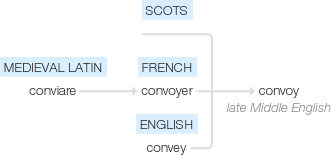Convoy
late Middle English (originally Scots, as a verb in the senses ‘convey’, ‘conduct’, and ‘act as escort’): from French convoyer, from medieval Latin conviare (see convey).
wiktionary
From Middle English, from Old French convoier, another form of conveier, from Medieval Latin convio(“to accompany on the way”), from Latin com-(“together”) + via(“way”).
etymonline
convoy (n.)
1550s, "the act of guiding or escorting for protection," from obsolete verb convoy "to accompany on the way for protection" (late 14c.), from Old French convoiier, from Vulgar Latin *conviare, literally "go together on the road," from assimilated form of Latin com "with, together" (see con-) + via "way, road" (from PIE root *wegh- "to go, move, transport in a vehicle").
Compare convey. The meaning "an escort, an accompanying and protecting force" is from 1590s; sense transferred by c. 1600 to "train of ships or wagons carrying munitions or provisions in wartime under protection of escort."
